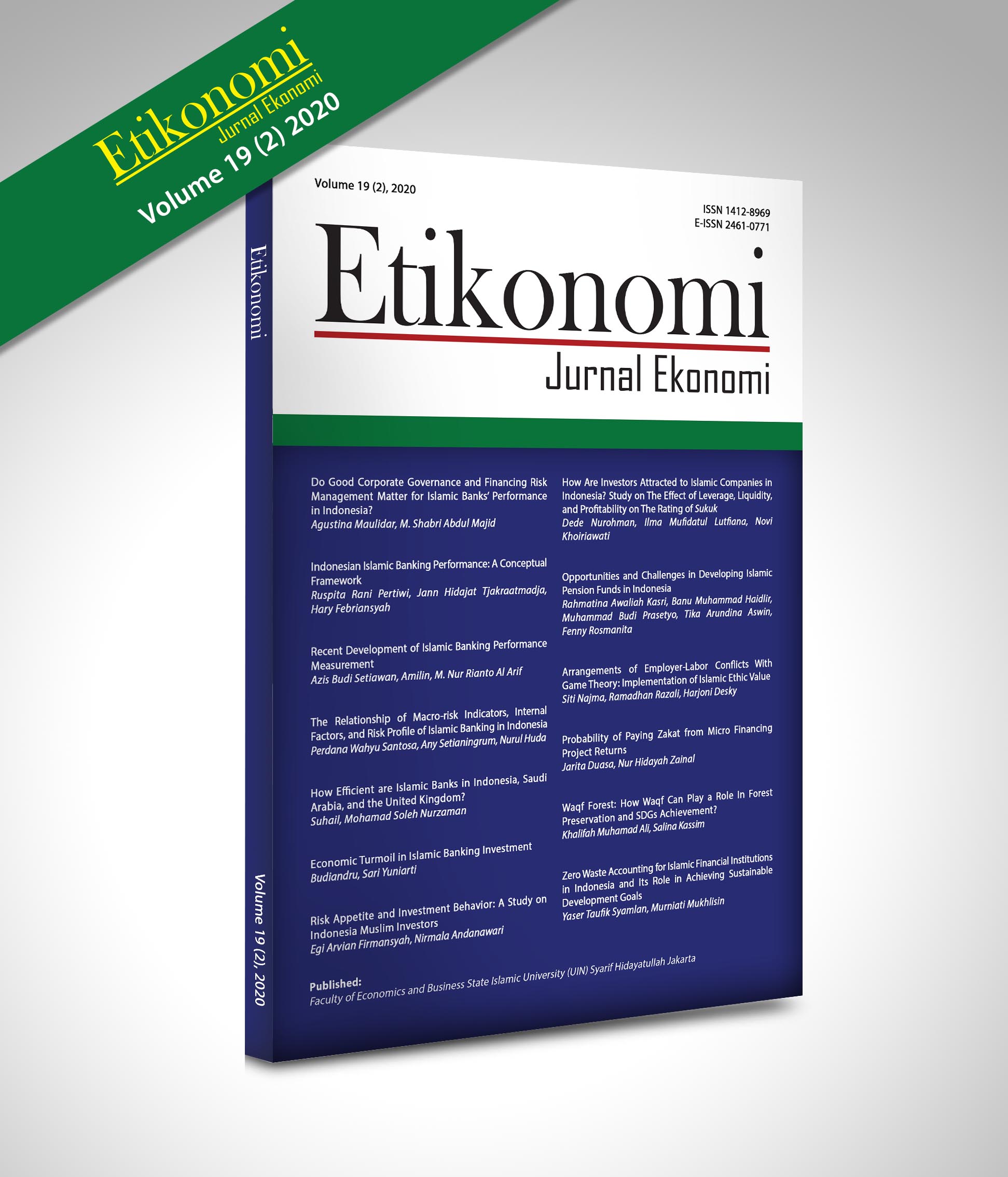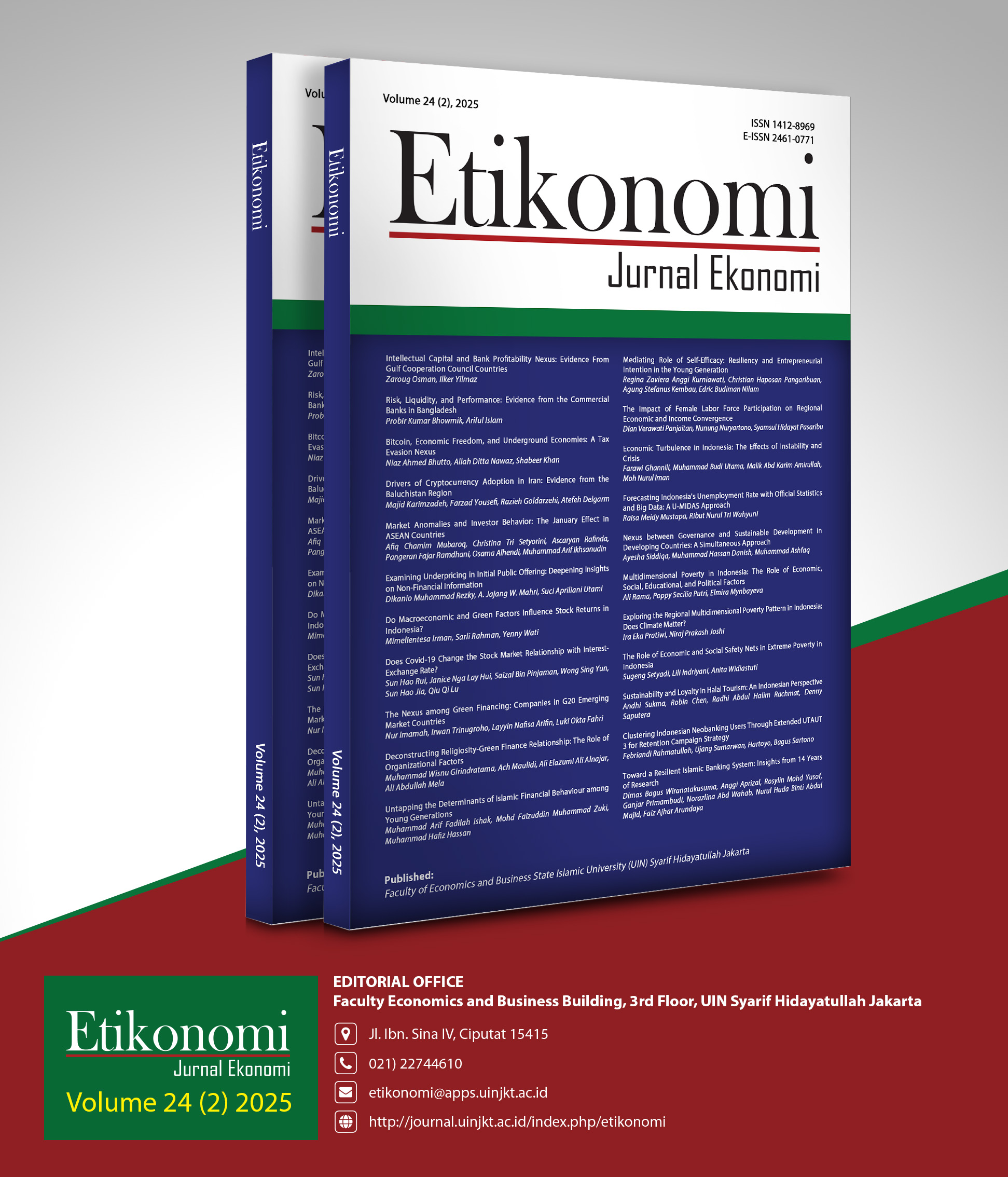Probability of Paying Zakat from Micro financing Project Returns
DOI:
https://doi.org/10.15408/etk.v19i2.15113Keywords:
zakat, microfinance, amanah ikhtiar Malaysia, logit regressionAbstract
The study aims to investigate the probability of paying zakat among participants or recipients of micro-finance scheme of Amanah Ikhtiar Malaysia. A survey is conducted on participants of Amanah Ikhtiar Malaysia scheme using convenience sampling in Perak and Kelantan. Data from the survey are analyzed using descriptive statistics and logistic regression. The results show that higher probability of paying zakat among respondents determined by small household size, lower per capita income, higher education level and those living in Perak. Thus, efforts should be taken by zakat institutions to well develop good and efficient methods of zakat collection among the participants specifically among low educated and higher income/return of the projects.
JEL Classification: C31, C83, D64, I39, G23
How to Cite:
Duasa, J., & Zainal, N. H. (2020). Probability of Paying Zakat from Micro Financing Project Return. Etikonomi: Jurnal Ekonomi, 19(2), 333-348. https://doi.org/10.15408/etk.v19i2.15113.
Downloads
References
Abdullah, L., & Wan Ahmad, W. M. (2012). Juristic Discourse on the Delay in Payment and Distribution of Zakat. Middle East Journal of Scientific Research, 12(2), 176-181.
Abdullah, M., & Sapiei, N. (2018). Do Religiosity, Gender and Educational Background Influence Zakat Compliance? The Case of Malaysia. International Journal of Social Economics, 45(8), 1250-1264.
Abdullah, R. (2010). Zakat management in Brunei Darussalam: A case study. In Proceedings of Seventh International Conference The Tawhidi Epistemology: Zakat and Waqf Economy. Bangi, Malaysia. 375-407.
Ab. Rahman, A., & Omar, S. M. N. (2010). Tauhid Epistemology in Increasing the Number of Zakat of Wealth Payers and Its Contribution toward the Development of Malaysia Economy. In Proceedings of Seventh International Conference The Tawhidi Epistemology: Zakat and Waqf Economy. Bangi, Malaysia. 53-63.
Aidit, G. (1998). Zakat-Satu Tinjauan (Zakat-One Review). Petaling Jaya, Malaysia: IBS Buku Sdn. Bhd.
Ali, E. M. T. E., Rahman, S. M. A. S. A., Baba, Z. S., & Muda, H. (2018). The Employees’ Awareness on the Monthly Zakat Deduction Scheme in Terengganu. International Journal of Academic Research in Business and Social Sciences, 8(7), 999-1010.
Ali, M. N. M., Hairunnizam, W. & Nor Ghani, M.N. (2003). Kesedaran Membayar Zakat Pendapatan kakitangan Professional: Kajian Kes di UKM (Awareness of Paying Zakat on Professional Employee Income: A Case Study in UKM). Seminar Kebangsaan Dasar Awam Dalam Era Globalisasi: Penilaian Semula Ke Arah Pemantapan Strategi. 16-17 September. Bangi, Malaysia.
Al-Qardawi, Y. (1993). Fiqh Zakat (Fiqh of Zakat). Jakarta: Litera AntarNusa.
Al-Qardawi, Y. (1998). Peranan Nilai dan Akhlak dalam Ekonomi Islam (The Role of Values and Morals in Islamic Economics). Kuala Lumpur: Metacorp Bhd.
Ayuniyyah, Q. (2011). Factors Affecting Zakat Payment Through Institution of Amil: Muzakki’s Perspectives Analysis – Case Study of Badan Amil Zakat Nasional (BAZNAS). Jurnal Ekonomi Islam Al-Infaq, 2(2), 49-64.
Bakar, N. B. A., & Rashid, H. M. A. (2010). Motivations of Paying Zakat on Income: Evidence from Malaysia. International Journal of Economics and Finance, 2(3), 76-84.
Cokrohadisumarto, W. M., Zaenudin, Z., Santoso, B., &Sumiati, S. (2019). A Study of Indonesian Community’s Behaviour in Paying Zakat. Journal of Islamic Marketing, 11(4), 961-976. https://doi.org/10.1108/JIMA-10-2018-0208.
Firdaus, M., Beik, I. S., Irawan, T., & Juanda, B. (2012). Economic Estimation and Determinations of Zakat Potential in Indonesia. Jeddah: Islamic Research and Training Institute.
Furqani. H, Mulyany. R, and Yunus. F. (2018). Zakat for Economic Empowerment of the Poor in Indonesia: Models and Implications. Jurnal Kajian Ekonomi dan Binis Islam, 11(2), 392- 411.
Ghani, E. K., Aziz, A. A., Tajularifin, S. M., & Samargandi, N. (2018). Effect of Board Management and Governmental Model on Zakat Payers' Trust on Zakat Institutions. Global Journal Al-Thaqafah, (Special Issue), 73-86.
Hafidhuddin, D. (2002). Zakat Dalam Perekonomian Modern (Zakat in the Modern Economy). Jakarta: Gema Insani Press.
Hassan, M. K. (2010). An Integrated Poverty Alleviation Model Combining Zakat, Awqaf and Micro-Finance. In Proceeding Seventh International Conference The Tawhidi Epistemology: Zakat and Waqf Economy. Bangi, Malaysia. 261-281.
Hosmer, D. W., & Lemeshow, S. (1989). Apllied Logistic Regression. New York: John Wiley & Sons.
Idris. K.M. (2006). Efek Persepsi Undang-Undang dan Penguatkuasaan Zakat terhadap Gelagat Kepatuhan Zakat Pendapatan Gaji (Effects of Legal Perception and Zakat Enforcement on Salary Income Zakat Compliance Behavior). Journal of Ethics, Legal and Governance, 2, 32–41.
Ismail, S. B. H., Jogeran, J. B., Noor, A. H. M. (2012). Determinant Factors of Paying Zakat On Employment Income By Government Servants in Malaysia. International Conference on Islamic Economy and Business.
Jaffar, M. A. , Affif, A., Amri, H. and Sahezan, C. N., (2011). A Study on the Factors Attribute to Non Participation of Zakat Income Among the Muslim Community in Selangor. 2nd International Conference on Business and Economic Research, 14-16 March 2011, Langkawi, Kedah, Malaysia.
Kamil, M.I. (2005). The Role of Intrinsic Motivational Factors on Compliance Behaviour of Zakat on Employment Income, in Isu-isu Kontemporari Zakat di Malaysia (1st ed.), 137-170, Melaka: UiTM.
Kassim S., Kassim S.N., Othman N. (2019). Islamic Microfinance in Malaysia: Issues and Challenges. In: Mat Noor A., Mohd Zakuan Z., Muhamad Noor S. (Eds). Proceedings of the Second International Conference on the Future of ASEAN (ICoFA) 2017, Vol. 1. Singapore: Springer, 367-377.
Khamis, M. R., &Yahya, N. C. (2015). Does Law Enforcement Influence Compliance Behaviour of Business Zakat among SMEs?: An Evidence via Rasch Measurement Model. Global Journal Al Thaqafah, 5(1), 19-32.
Lunn, J., Klay, R. & Douglass, A. (2001). Relationship among Giving, Church Attendance, and Religious Belief: The Case of the Presbyterian Church (USA). Journal for the Scientific Study of Religion, 40(4), 765-775.
Mahanani, Y., Novianti, T., Wiliasih, R., & Kassim, S. (2018). Factors Affecting Employees’ Preference to Pay Zakat: Case of Amil Zakat Institution of Bogor Agricultural University. Proceeding International Conference of Zakat 2018, 15-16 November, Universitas Gadjah Mada, Yogyakarta, Indonesia.
Mokhtara, S. S. B. S., Mahomeda, A. S. B. B., & Hashima, H. (2018). The Factors Associated with Zakat Compliance Behaviour Among Employees. International Journal of Economics and Management, 12(Special Issue 2), 687-696 .
Mujiyati, B. R., & Sholahuddin, M. (2010). Some Influence Factors of Zakat-Infaq-Shadaqah collecting: A Case in Surakarta, Central Java, Indonesia. In Proceedings of Seventh International Conference The Tawhidi Epistemology: Zakat and Waqf Economy. Bangi, Malaysia. 435-445.
Nor Ghani, M. N., Mariani, M., Jaafar, A., & Nahid, I. (2001). Can Privatization Improve Performance? Evidence from Zakat Collection Institutions. Islamic Economy Workshop. Faculty of Economics, Universiti Kebangsaan Malaysia, Bangi, Malaysia.
Othman, Y., Yusuff, M. S. S., & Latib, M.F.A. (2018). Motivations for Paying Income Zakat among UniSHAMS’ Employees. International Journal of Academic Research in Business and Social Sciences, 8(10), 619-628.
Reinstein, D. (2006). Does One Contribution Come at the Expense of Another? Empirical Evidence on Substitution Between Charitable Donations. Economics Discussion Papers. University of Essex.
Saad, R. A. J., Bidin, Z., Md. Idris, K., & Md. Hussain, M.H. (2010). Faktor-Faktor yang Mempengaruhi Gelagat Kepatuhan Zakat Perniagaan (Factors Affecting Business Zakat Compliance Behavior). Management Journal, 30, 49–61.
Saad, R. A. J., Farouk, A. U., Wahab, M. S. A., & Ismail, M. (2019). What Influence Entreprenuer to Pay Islamic Tax (Zakat)?. Academy of Entrepreneurship Journal, 25(1), 1-13.
Saad, R. A. J., Farouk, A. U., & Kadir, D. A. (2020). Business Zakat Compliance Behavioral Intention in a Developing Country. Journal of Islamic Accounting and Business Research, 11(2), 511-530. https://doi.org/10.1108/JIABR-03-2018-0036.
Sanusi, N. A., Wahab, N. A. A. & Bahar, N. F. M. (2005). Gelagat Kepatuhan Pembayaran Zakat Pendapatan: Kajian Kes UUM (Income Zakat Payment Compliance Behavior: A Case Study of UUM). Proceeding of Seminar Ekonomi dan Kewangan Islam, 29-30 August 2005, Fakulti Ekonomi, Universiti Utara Malaysia, Kedah, Malaysia.
Tahir, M. Z. & Majid, M. (1999). Prestasi Kutipan dan Agihan Zakat di Malaysia (Zakat Collection and Distribution Performance in Malaysia). In Proceeding Seminar Pengeluaran Awam dan Swasta: Justifikasi dan Realiti di Malaysia. Universiti Kebangsaan Malaysia. 293-306
Tajuddin, T. S., Azman, A.S. & Shamsuddin, N. (2016). Zakat Compliance Behaviour on Income among Muslim Youth in Klang Valley. Shariah Journal, 24(3), 445-464
The Star. (2017). Microfinance in Malaysia Benefits over 1 Million Enterprises. Retrieved from https://www.thestar.com.my/business/business-news/2017/05/22/microfinance-in-malaysia-benefits-over-1-million-enterprises/
Wahid, H., Noor, M.A.M., Ahmad, S. (2005a). Kesedaran Membayar Zakat: Apakah Faktor Penentunya? (Awareness of Paying Zakat: What Are the Determining Factors?). International Journal Management Studies, 12(2), 171–189.
Wahid, H., Ahmad, S. & Noor, M.A.M. (2005b). Kesedaran Membayar Zakat Pendapatan di Malaysia (Awareness of Paying Income Zakat in Malaysia.). Islamic Economic and Finance Seminar. Universiti Utara Malaysia. 29-30 August, 265-274.














